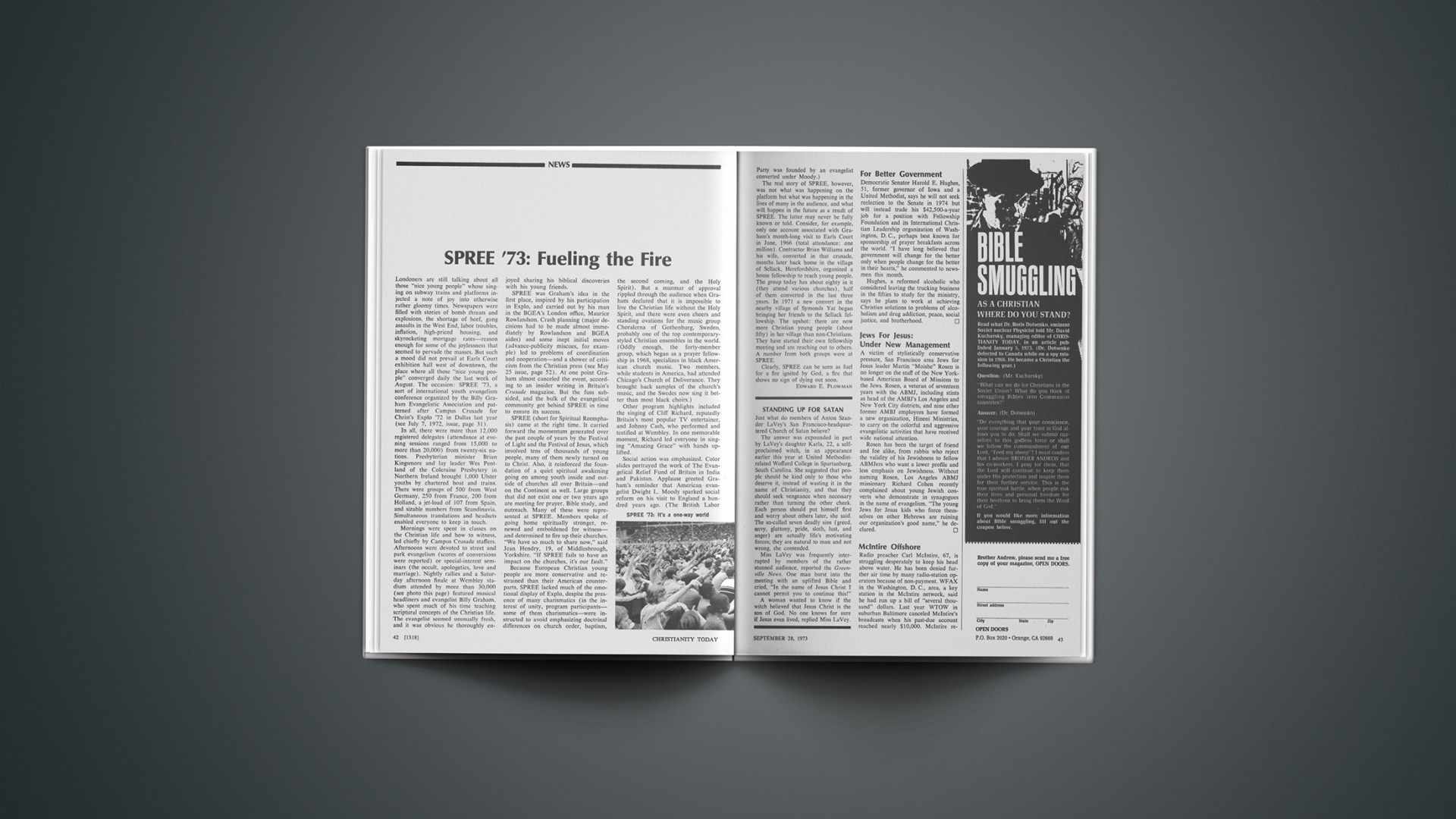Now is the time to start learning the lessons of Key 73 and converting them into positive strategies for the coming years.
In thousands of churches across North America this year, there have been unprecedented efforts in evangelism. It is fairly safe to say that never before have so many Scriptures been distributed, so many Christian tracts presented, and so many doors knocked upon for the sake of the Gospel. Evangelical enterprises are operating at record peaks, Christian faith is strikingly evident from bumper stickers to jewelry. People on this continent are more conscious of the person of Jesus Christ than at any other time in history. Revival fires may not yet have been ignited, but the sparks certainly are flying.
Granted, Key 73, conceived as a CHRISTIANITY TODAY editorial in 1967, may not be the major stimulus in this spiritual awakening. The awakening might have developed without Key 73 (though one is tempted to speculate that if Key 73 had not been organized, the current movement might well have been obliged to produce something else like it). But no informed observer of the evangelical scene can deny that something was already happening at the dawn of the year and that the momentum has continued to build—at the very least spurred on by Key 73. The conciliar movement has produced nothing comparable in terms of lay participation.
In light of these facts, it is strange to see Key 73 already characterized in some quarters as a flop or disappointment. Perhaps the anticipations have been too high. Some may have been expecting a spectacular spiritual sweep. If a highly visible phenomenon is what was expected, then Key 73 has, to be sure, fallen short so far. But for most pastors and church workers who know anything about how hard it is to get anything at all moving, the achievements of 1973 are cause for rejoicing and thanksgiving.
Christians become even more grateful when they consider seriously the special problems that faced Key 73. For one thing, despite all the complaints about rising prices, we are still living in a period of tremendous affluence that has tended to make people smugly satisfied. Our present economic climate is not especially conducive to looking up. Many families are on a recreational binge that hardly leaves time even to think of spiritual concerns. Even young people, who for all the upheavals of the sixties nonetheless seemed to be showing a more idealistic bent, now appear less inclined in that direction. Lack of implementation of Key 73 among youth groups and on college and seminary campuses is probably its most glaring defect.
Paradoxical as it may sound, even some aspects of the current surge of religious interest work against authentic evangelism. The charismatic movement is the best example: the emphasis is so introspective that it takes a heavy toll in zealous Christian witness and compassionate concern for the welfare of others. Opposition from Jews and separatist fundamentalists has also tempered the impact of Key 73.
A much greater obstacle is one that has been with us for a long time. It is simply the reluctance of Christian believers to be outspoken witnesses for the Gospel. One of the brightest new stars on the religious journalistic horizon, The Texas Methodist, put it this way last month: “We believe it is time for Christians to drop the gimmicks and face the facts: our continent is not being effectively called to Christ because relatively few Christians make an effort to share their faith with others.” Ken Briggs of Newsday made a similar point in another analysis of Key 73: “When the man on the street is impressed to serve as an evangelist, well, that seems a little pushy to him. Besides, the average Christian knows precious little about his faith and would be tongue-tied in trying to explain it to himself, let alone convincing anyone else.”
The reticence comes from more than a fear of embarrassment. It may be a major cultural problem for the church today. Even professionals who speak regularly of Christ in public are hard pressed to bring up the Gospel in casual conversation and make it sound natural. In the present cultural climate, religious subjects are treated as if they belonged to a different realm of reality and required semantic handling distinctively separate from that of ordinary conversation. Part of the reason, as Briggs suggests, may be that we are not so sure of ourselves as we should be. A more accurate way of describing it would be to say that we are not sure of ourselves in religious matters in the same way in which we are sure of ourselves in other areas.
Besides being used to win many souls to Christ this year, Key 73 has served as a good pilot program. It has brought a number of evangelistic impediments further into the light. Christians must now deal with these, using them not as a reason for calling the whole thing off on December 31, but rather as data from which even more effective outreaches can be developed.










